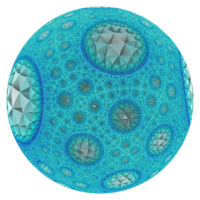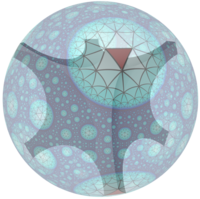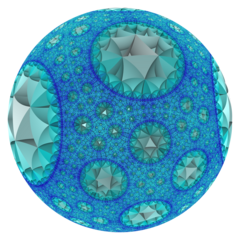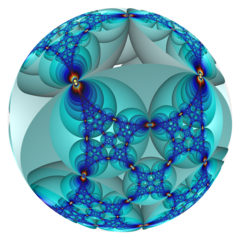Order-7 cubic honeycomb
From Wikipedia, the free encyclopedia
In the geometry of hyperbolic 3-space, the order-7 cubic honeycomb is a regular space-filling tessellation (or honeycomb). With Schläfli symbol {4,3,7}, it has seven cubes {4,3} around each edge. All vertices are ultra-ideal (existing beyond the ideal boundary) with infinitely many cubes existing around each vertex in an order-7 triangular tiling vertex arrangement.
| Order-7 cubic honeycomb | |
|---|---|
| Type | Regular honeycomb |
| Schläfli symbols | {4,3,7} |
| Coxeter diagrams | |
| Cells | {4,3} |
| Faces | {4} |
| Edge figure | {7} |
| Vertex figure | {3,7} |
| Dual | {7,3,4} |
| Coxeter group | [4,3,7] |
| Properties | Regular |
Images
 Cell-centered |

|
 One cell at center |
 One cell with ideal surface |
Related polytopes and honeycombs
Summarize
Perspective
It is one of a series of regular polytopes and honeycombs with cubic cells: {4,3,p}:
It is a part of a sequence of hyperbolic honeycombs with order-7 triangular tiling vertex figures, {p,3,7}.
Order-8 cubic honeycomb
| Order-8 cubic honeycomb | |
|---|---|
| Type | Regular honeycomb |
| Schläfli symbols | {4,3,8} {4,(3,8,3)} |
| Coxeter diagrams | |
| Cells | {4,3} |
| Faces | {4} |
| Edge figure | {8} |
| Vertex figure | {3,8}, {(3,4,3)}  |
| Dual | {8,3,4} |
| Coxeter group | [4,3,8] [4,((3,4,3))] |
| Properties | Regular |
In the geometry of hyperbolic 3-space, the order-8 cubic honeycomb a regular space-filling tessellation (or honeycomb). With Schläfli symbol {4,3,8}. It has eight cubes {4,3} around each edge. All vertices are ultra-ideal (existing beyond the ideal boundary) with infinitely many cubes existing around each vertex in an order-8 triangular tiling vertex arrangement.
 Poincaré disk model Cell-centered |
 Poincaré disk model |
It has a second construction as a uniform honeycomb, Schläfli symbol {4,(3,4,3)}, Coxeter diagram, ![]()
![]()
![]()
![]()
![]()
![]() , with alternating types or colors of cubic cells.
, with alternating types or colors of cubic cells.
Infinite-order cubic honeycomb
| Infinite-order cubic honeycomb | |
|---|---|
| Type | Regular honeycomb |
| Schläfli symbols | {4,3,∞} {4,(3,∞,3)} |
| Coxeter diagrams | |
| Cells | {4,3} |
| Faces | {4} |
| Edge figure | {∞} |
| Vertex figure | {3,∞}, {(3,∞,3)}  |
| Dual | {∞,3,4} |
| Coxeter group | [4,3,∞] [4,((3,∞,3))] |
| Properties | Regular |
In the geometry of hyperbolic 3-space, the infinite-order cubic honeycomb a regular space-filling tessellation (or honeycomb). With Schläfli symbol {4,3,∞}. It has infinitely many cubes {4,3} around each edge. All vertices are ultra-ideal (existing beyond the ideal boundary) with infinitely many cubes existing around each vertex in an infinite-order triangular tiling vertex arrangement.
 Poincaré disk model Cell-centered |
 Poincaré disk model |
It has a second construction as a uniform honeycomb, Schläfli symbol {4,(3,∞,3)}, Coxeter diagram, ![]()
![]()
![]()
![]()
![]()
![]() , with alternating types or colors of cubic cells.
, with alternating types or colors of cubic cells.
See also
References
External links
Wikiwand - on
Seamless Wikipedia browsing. On steroids.













